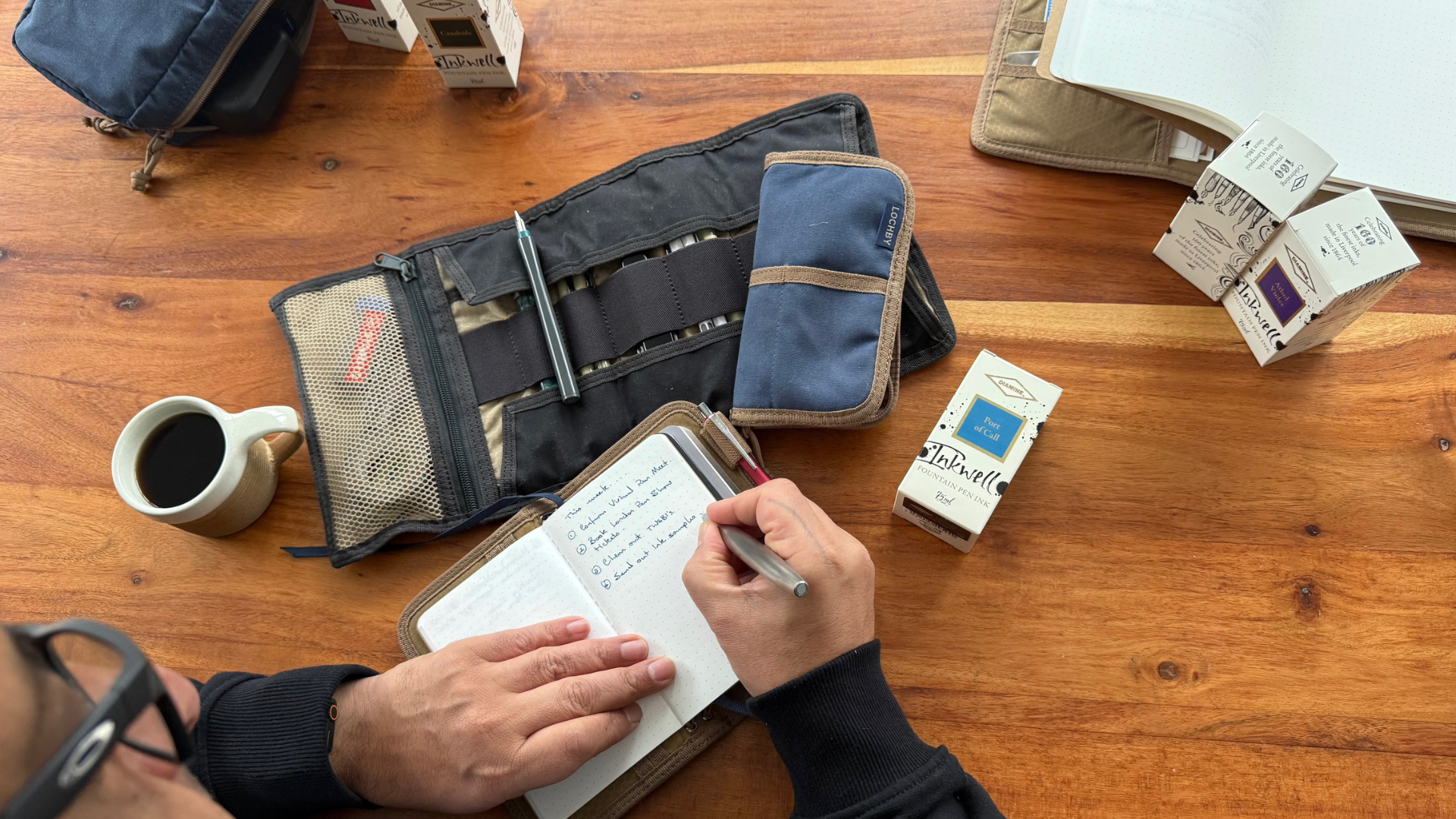The time we live in, though strange, has become the new normal. Difficult as it had been to step out of our comfort zones, we've ended up adapting to the coronavirus pandemic in our own ways: eased ourselves into new routines, developed new habits, and made the necessary adjustments to be able to continue with our lives. But despite this, the current global situation has introduced us to brand new stressors that we have yet to learn how to tackle each day. And while physical health is our number one priority, ensuring we're in tiptop shape mentally is just as vital.
In a time where we spend most days stuck in our own heads, isolated in our homes and encouraged to follow social distancing, humanity has become lonely in ways it has never been. This can take a toll on our mental health, which is why journaling has never been more relevant than it is right now. Journals give us a channel to express our emotions and find clarity in the midst of uncertainty.
But what do you write about if you're almost always indoors? What if your days look and feel the same, blurred together by the sporadic lockdown mandated by governments all around the world? While we understand that our current circumstances may feel uninspiring, in this article, we've compiled a list of ways you can journal your way through the pandemic!
1. Join a pandemic journaling projects.
I know what you're thinking. Is that a thing? It might seem unbelievable, but yes, such a project exists. The Pandemic Journaling Project is a journaling platform during the COVID-19 pandemic, as well as a research study with the aim to learn about the impact that the coronavirus pandemic has on people's everyday lives. It's also a means to preserve a record of people's experiences during a crucial time in history. According to their website, the goal of the project "is to make sure that ordinary people struggling through this pandemic have their voices heard, and their experiences remembered." Anyone over 18, no matter where you're from, can join.
The wonderful thing about this journaling project is that they provide you with two prompts each week: the first one is a standard weekly question, while the second is a choice between two prompts. No more coming up with your own topics, especially if you're suffering from writer's block. You can also choose what medium to use in order to share your thoughts: through text, an image, a combination of the two, or a voice recording.
Since this is a weekly thing that they email or send a message to you about, you won't have to worry about forgetting to journal. That and you're contributing to a great cause: all this information will be used for research and is going to be available to historians of the future.
2. Try a gratitude journal.
If you're journaling for any reason other than documenting everything you're grateful for, then the pandemic is a good time to start gratitude journaling. This is because ever since the current social crisis began, we've heard nothing but the coronavirus 24/7 across every platform available to us which, according to an article from the American Psychological Association, "may amplify distress." Gratitude though, is an effective means to fight off all that stress. Known as a natural antidepressant, being grateful activates neural circuits in our brain that helps release dopamine and serotonin - two neurotransmitters that allow us to feel bliss. This makes us capable of recreating feelings of happiness and contentment!
But more than just feeling happy, writing down all of the things that we're grateful for can help shift our perspective into a more positive one. A lot of people use our Pocket Journal so they can easily bring a reminder of everything they’re thankful for wherever they go. It’s extremely portable and rugged enough to stand up to your daily tasks for years to come. By gratitude journaling, we not only get to focus on the good that we still have in our lives, we also get to realize that despite what's happening in the world, there's still so much to be thankful for.
3. Start planning the future.
Journaling our plans for the future? During a period in history where they can easily fall apart due to the ever evolving COVID-19 situation? You're probably wondering why this is even part of the list, but it's here for a reason.
Since the pandemic began back in 2019, many plans and events have been postponed, rescheduled, or worse, cancelled. But this shouldn't scare us into putting everything in our life on hold. In the book Stumbling on Happiness by psychologist Daniel Gilbert, he quoted a philosopher who said, "the human brain is an "anticipation machine," and "making future" is the most important thing it does." The same quote is referenced by a study that found a link between anxiety and an unclear future. Apparently, having no idea what the future holds can have a negative impact on our mental health.
Instead of letting ourselves fall into a pit of despair about plans that may never come to fruition, it's the perfect time for us to look forward to tomorrow. You may ask: are you planting seeds of false hope? Not really. Planning like this with the help of journals will help sustain you during this difficult time where a lot is at stake. That and on the bright side, you're also preparing for that glorious moment when this is all over and you can finally make your plans happen.
4. Don't forget to stay in shape.
With public spaces either still limited or a no-go in certain parts of the world, most of us are forced to stay indoors with barely anything to do after school or work. And for non-fitness enthusiasts, what little exercise we get from walking to and from places pre-pandemic has since become nonexistent. With so much free time in our hands, I know it's tempting to just watch everything on Netflix all day. We're not saying you shouldn't binge on that series you've been eyeing if you want to, but here's something to consider: according to a study, sitting too much is harmful to our physical health and indicates that "Too much sitting overall and prolonged periods of sitting also seem to increase the risk of death from cardiovascular disease and cancer."
Journals - whichever format you end up choosing - are the perfect tools for planning and tracking your exercise routine and progress. You can fill up the pages with exercises that can be done at home without needing any gym equipment. From push ups to lunges, jumping jacks and squats, to planks and burpees, there's no excuse not to get started on being healthy. If this is your first time exercising or it's been a while since you last stretched a muscle, take little steps: gradually increase the number of repetitions and amount of time you spend on each exercise until you get the hang of things.
5. Pick up a hobby.
Or restart an old one. You don't have to be a prisoner of your own mind during the pandemic while confined at home, not when you have something to keep you busy. But having a hobby is more than just something to fill up free time with - according to Psychology Today, there are many advantages to it that can increase efficiency and help you cope with stress. But the benefits don't end there. If you're part of a workforce, a published study in the Journal of Occupational and Organizational Psychology found that employees who had creative hobbies had higher performance evaluations - anywhere from 15% to 30% - compared to those who didn't.
Journaling in itself is a hobby, but is also a great way to keep records relevant to other hobbies that you might have.
If you're into cooking, then journals can instantly become recipe guides that you can pass on to your children - the LOCHBY Field Journal is built to last, so your children can pass it on to their children and so on! If you like the arts, you can start an art journal as another medium to express yourself creatively - our Tool Roll is especially handy to carry your favorite art supplies around. Learning another language for fun? Journal in your target language and watch your grammar and vocabulary improve on a daily, weekly, and monthly basis.
There's literally no limit to how a hobby - and journaling - can help you with your daily life.
Conclusion
What other uses have you found for your journal since the pandemic began? How has journaling helped you cope with the quarantine? Did you notice any other health benefits brought about by journaling, especially during this global crisis? We'd love to hear how keeping a journal has helped you remain productive during the COVID19 crisis.
With that said, as always, happy journaling and keep on creating!





Share:
Journaling: The Goal Setting Game Changer
4 Reasons Why You Should Start A Habit Tracker Now